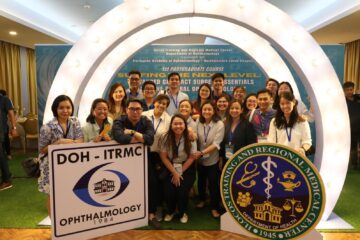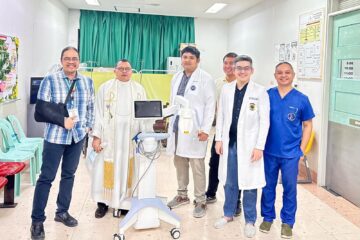Covid-19 at The Sentro Oftalmologico Jose Rizal
The COVID-19 pandemic brought about a lot of challenges to the practice of ophthalmology. Government-mandated quarantine restrictions and the declaration of the Philippine General Hospital in March 2020 as one of the COVID Referral Centers in Metro Manila added to the complexity of fulfilling our mandate of serving our countrymen in need of ophthalmologic care.
In the first 3 months of the pandemic, the Sentro Oftalmologico Jose Rizal was closed, with medical and nursing staff deployed to the COVID wards. Only patients with urgent ophthalmologic conditions which did not require admission or surgery were seen at the emergency room. All surgeries, even those considered as sight-saving, were cancelled.
Despite all the cancellations of face-to-face consultations and surgeries, learning did not cease. The advent of online learning allowed the Department to hold and attend lectures via different online platforms such as Zoom. Webinars from well-renowned ophthalmologists here and abroad became more easily accessible to everyone. Zoom became the avenue for theoretical learning for all the trainees.
Following the lowering of restrictions in NCR to GCQ in June 2020, the SOJR was then reopened. In line with PGH transitioning to the use of electronic medical records, residents, fellows, and staff of the DOVS converted the subspecialty records of patients into digital copies. Safety protocols, which were in line with the PGH HICU guidelines, were developed to ensure patient and staff safety and minimize transmission risks. These included symptom and temperature checks at entry points of the building, setting up an appointment system for consults, installation of acrylic barriers in areas of increased risk of close patient contact (e.g. slit lamps, information and scheduling counters), and regular UV disinfection of clinics and operating rooms. Patients undergoing surgery were required to undergo RT-PCR testing as part of routine surveillance. Contact tracing protocols were implemented in case of exposures to patients who eventually turned symptomatic, or had a positive swab prior to surgery.
Slowly but steadily, the patient census of the department increased though still a far cry from pre-pandemic levels. Telemedicine consults were further developed to maximize distant consultation while at the same time, minimizing patient exposure. This paved way to the triaging system of the Department to prioritize which patients warranted urgent face-to-face consults. Urgent surgeries and procedures were gradually reintroduced.
In August 2020, the day-to-day operations of the department had to slow down due to increasing cases of COVID-19 in Metro Manila. At this time, all outpatient consults shifted from face-to-face to telemedicine. Only urgent ophthalmologic surgeries were scheduled. At the end of the enhanced community quarantine period and with the decline in number of cases, more outpatients in clinics were accommodated for face-to-face consults. Elective surgeries were now allowed as well. Other activities of the department, such as weekly department conferences and subspecialty rounds – now all held virtually – were resumed. Residents took the OPEX, held online for the first time, in October 2020. Come December, the DOVS, in partnership with our colleagues from ORL, spearheaded the Christmas celebrations in PGH, culminating in the successful PGH Variety Show, held simultaneously online and at the PGH Atrium.
Things were gradually improving at the end of 2020, and this was sustained throughout the first few weeks of the new year.
On the first anniversary of the pandemic however, there was again a spike in cases in Metro Manila due to the emergence of new SARS-CoV-2 variants. Not only was there an increase in COVID-19 patients admitted in PGH, there were also outbreaks in several departments. Our department was not spared, with several residents and fellows testing positive for the virus and a few more who had to undergo quarantine. SOJR was forced to close its doors once again. Face-to-face appointments were converted to telemedicine consults. Elective surgeries were postponed. It was around this time that the vaccination program in PGH kicked off. Over the next few weeks, residents, fellows and consultants were vaccinated which had provided additional protection to COVID-19.
From there on, the Department did not stop from serving the patients their deserved ophthalmic care. Safety and health protocols were fortified to strengthen the protection of the health workers against COVID-19. From then on, the Department has resumed catering ophthalmic care to the public, while at the same, protecting ourselves from the disease. The outpatient department and eye instrument center have required all consultations in appointment basis. All personnel with direct patient care shall be at least in level 2.5 PPE. The operating room has required 3-day validity of RT PCR nasopharyngeal swab of all patients prior to the admission and operation. The SOJR ward has been redesigned and renovated to accommodate beds for COVID suspect and COVID high risk patients. The façade of the building has been bombarded with tarpaulins and posters containing educational materials regarding COVID-19 and how it affected the system of the Department. All walls of the building were placed with reminders of safety and health protocols such as handwashing, alcohol disinfection, appropriate and correct wearing of masks and shields etc.
In the future, the Department’s plans will be geared towards delivering quality care to patients and providing full protection to the trainees and consultants. Safety and health protocol manuals will be regularly revisited and developed. Telemedicine will be further improved. Personal protection equipment and barriers will be amended. The department is looking forward to resuming and conducting our pre-pandemic activities such as phacoemulsification and intraocular lens missions, lens wetlabs etc. The Department will continue to strive to provide quality service to its patients even in the face of the pandemic.
Through the years, no matter what challenges the Department continues to face, the Department will continue to be a pillar in the field of Ophthalmology in the Philippines. It continues to envision becoming a globally competitive, socially responsible, community oriented and sustainable world-class center committed to excellence in eye care, the prevention of blindness, as well as leadership in ophthalmology. Its graduates, spread around the country and in the world, are testaments of the excellence embodied by this institution.

Marion Rose P. Marquez, MD
Currently a senior resident of the Department of Ophthalmology and Visual Sciences of the University of the Philippines – Philippine General Hospital. She plans to take Neuro-ophthalmology for her fellowship

Aramis B. Torrefranca Jr., MD
Currently the Chief resident of the Department of Ophthalmology and Visual Sciences of the University of the Philippines – Philippine General Hospital. He plans to take Pediatric Ophthalmology and Strabismus, and Retinoblastoma for his fellowship.







